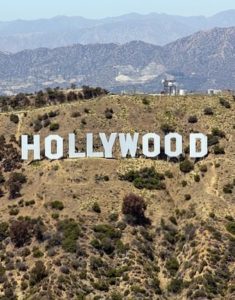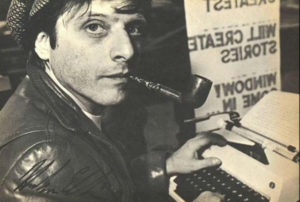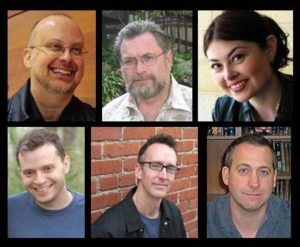 It’s been a while since I’ve posted here. There’s a good reason for that. I’ve been working.
It’s been a while since I’ve posted here. There’s a good reason for that. I’ve been working.
I’ve always regarded blogging as a leisure activity, fun when there’s time for it, but readily set aside when big projects hit.
Last June, with a new film script sold and an ambitious novel expanding beyond expectations, I realized it was time to focus on fiction. And that’s pretty much where I was until I finished the book early last week. At that point, with the manuscript mailed off and fending for itself, I got out from behind the desk and headed west for some social interaction with the good people involved in the film project.
It felt good getting out.
Offering a view of the Hollywood sign, my room on Melrose Avenue was a block from Paramount Studios and ten blocks from Xiomara, a fine Cuban restaurant in West Hollywood. That’s where I was last Thursday night, eating charcuterie and networking with a dream team of producers, directors, and writers–all taking part in something that I’ll be telling you more about just as soon as I can. In the meantime, since I once again have time for blogging, I’d like to share some thoughts on a topic I’ve been thinking about a lot lately, namely the benefits of temporarily disengaging from the world (something increasingly difficult in this age of social media) in order to focus on long-term projects.
 Back in the analog age (typewriters, carbon paper, onion skins), it was just me and the words. The phone might ring, but it was easily ignored. And even later, when I got my first computer, I was still master of the machine, with the biggest interruptions coming in the form of long load times and unexpected crashes (remember those?). The photo at right shows an early model of the 21st Century Scop using an early Tandy computer. One of those had a 128 KB memory.
Back in the analog age (typewriters, carbon paper, onion skins), it was just me and the words. The phone might ring, but it was easily ignored. And even later, when I got my first computer, I was still master of the machine, with the biggest interruptions coming in the form of long load times and unexpected crashes (remember those?). The photo at right shows an early model of the 21st Century Scop using an early Tandy computer. One of those had a 128 KB memory.
Things are different today, of course. Even locked away in my writing space, I can still have the interactive world at my fingertips. That can cause problems, as noted a few years back by comedic horror writer Jeff Strand, who got a laugh at the Stoker Awards when he riffed on the hapless writer who pauses at a crucial point in his work and muses: “I wonder what’s on Facebook.” Funny but true, and therein lies the dilemma for the 21st century scop.
Taking a moment to check social media might seem like a harmless distraction, but I find that such breaks in concentration pretty much derail my progress. When I pause in my writing, it’s usually because I’ve reached a crucial point in a story’s development, a place where deep concentration may lead to a stronger book and significant rewards down the road. That’s no time to break concentration and grab for the short-term reward of a Facebook “like” or “share.” And if I do take a moment to seek that instant gratification, even though the engagement may take me out of the fictional world for only a minute or two, I seldom reenter the story with the same deep focus I had when I left it. And let’s face it, most social media platforms are designed to keep us engaged, resulting in the intended “minute or two” expanding well beyond the original intentions.
As for blogging, it presents a different dilemma. Although I may not feel compelled to pause my writing to dash off a blog post, I find that the process of writing, laying out, proofing, and posting invariably consumes all my writing time for that day … and if it doesn’t, I’m still pretty much written out once the post goes up.
 To be sure, some writers embrace social distractions. Chuck Palahniuk does well writing in public places, and Harlan Ellison produced some award-winning stories sitting in bookstore windows back in the 1980s. But those writers seem to be the exception. Even the young Hemingway, who wrote in cafes, became irritable when Ford Madox Ford sat down beside him for an analog facechat. For some of us, writing takes concentration, and concentration requires solitude.
To be sure, some writers embrace social distractions. Chuck Palahniuk does well writing in public places, and Harlan Ellison produced some award-winning stories sitting in bookstore windows back in the 1980s. But those writers seem to be the exception. Even the young Hemingway, who wrote in cafes, became irritable when Ford Madox Ford sat down beside him for an analog facechat. For some of us, writing takes concentration, and concentration requires solitude.
A few years ago, partly in an effort to figure out how best to balance the distractions and benefits of social media, I moderated a couple of convention panels with writers who had developed some expertise in the use of social media. Among the panelists (pictured bellow) were Robert, J. Sawyer, Jonathan Maberry, Heidi Ruby Miller, Matt Schwartz, S. J. Browne, and Jon Sprunk. You can read some of what they had to say at here.
 The bottom line, we are social creatures. We can’t spend our entire lives in fiction. We need to get out, mix it up with the interactive world, engage with people who are not merely products of the imagination. But there are times when the work requires us to step away. The challenge is finding balance. What do you think?
The bottom line, we are social creatures. We can’t spend our entire lives in fiction. We need to get out, mix it up with the interactive world, engage with people who are not merely products of the imagination. But there are times when the work requires us to step away. The challenge is finding balance. What do you think?
If you’ve read this far, you no doubt have some opinions of your own. If you have a moment, please chime in by posting a comment below or by clicking the Facebook button at the top of this page.
That’s it for now. I trust it won’t take me another six months to post again. Until I do … scop on!
Images:
The Hollywood Sign.
The 21st Century Scop in the 20th Century.
Harlan Elison. http://mentalfloss.com/
Members of a virtual panel on Social Media


Leave a Reply